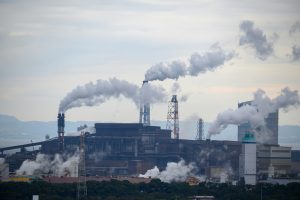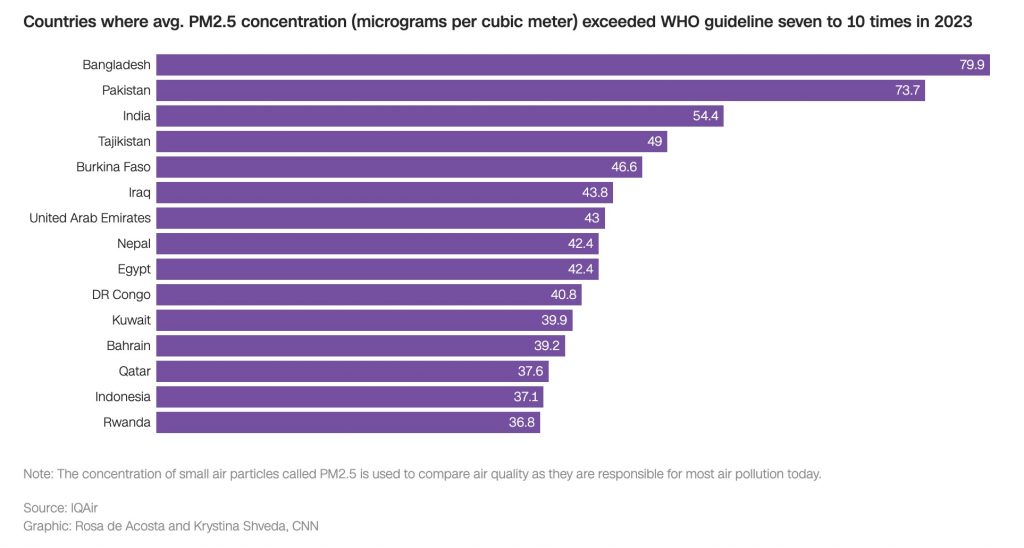Gasping for Breath – Valuing Clean Air for Vulnerable Populations
Jun 26th, 2024 | By admin | Category: Energy and Carbon EmissionsBy Suzanne York.
There are so many detrimental impacts from human activities that are extremely harmful to both people and the planet. The worst ones – and there are many – affect children, the elderly and other vulnerable populations the most. And yet we aren’t trying very hard to change the situation.
Increasingly Gray Skies
Take the problem of air pollution and kids. UNICEF states that dirty air accounts for 26% of newborn deaths worldwide, most related to complications of low birth weight and preterm birth. As children are growing, their developing lungs and brains makes them especially vulnerable to air pollution.
The recent report, State of Global Air report, found that nearly 2,000 children under five are dying every day from air pollution, which has overtaken poor sanitation and a lack of clean water to become the second biggest health risk factor for young children around the world.
For both children and adults, polluted air is now the second biggest killer globally, overtaking tobacco use, and second only to high blood pressure, as a risk factor for death among the general population.
The impacts of the climate crisis are also worsening air quality, according to the Health Effects Institute (HEI), which produced the report. They found that “as droughts become more severe and prolonged, and lands grow ever drier, wildfires ravage once-thriving forests and dust storms impact vast plains, filling the air with particles that linger for long periods of time.”
The world’s 100 most polluted cities are in Asia — with 83 of them are in India. It is of course the most populated country on Earth, where Indians under the age of 25 make up nearly half (47%) of the nation’s population.
According to a report by IQAir, an organization that tracks air quality worldwide, all 83 of these Indian cities exceeded the World Health Organization’s air quality guidelines by more than 10 times. IQAir found that across India, 1.3 billion people, or 96% of the population, live with air quality seven times higher than WHO guidelines.
The human-caused climate crisis, driven by the burning of fossil fuels, plays a “pivotal” role in influencing air pollution levels, the IQAir report said.
When the air quality index gets too high, municipalities have to close schools, public parks, malls and offices to try and protect their citizens.
Promising Solutions
Cooking with dirty fuels, including biomass, charcoal, paraffin and coal is a key driver of air pollution. The State of Global Air report concluded that “the solution to addressing household air pollution is simple and its impact is clear: improving access to clean cooking improves health. Furthermore, reducing the use of solid fuels for cooking can help reduce short-lived climate pollutants.”
Other steps that can be taken include better urban planning and energy efficient/clean energy vehicles and transit. Per the UN Environment Programme, countries are increasingly adopting incentives or policies promoting cleaner production, energy efficiency and pollution abatement for industries and have more policies outlawing the burning of solid waste.
There are a number of cities successfully tackling the pollution crisis. For example, in Accra, Ghana, a joint effort between the WHO and the Climate and Clean Air Coalition is supporting a city-wide assessment of the health benefits of switching to more sustainable transport, waste and household energy systems.
In Thailand, the city of Bangkok launched the Green Bangkok 2030 project, an effort to increase the ratio of green space in the city to 10sqm per person and have trees covering 30 per cent of the city’s total area.
Call to Action
What does this say about our society, when we let the most vulnerable suffer from a problem we can solve? We have clean air solutions but need to find the political and collective will to implement them, and to do so faster, in cities big and small. Countries around the world are suffering from extreme heat, and as climate impacts become more severe and widespread, we need to act with urgency to protect all citizens. There’s no excuse to allow children to suffer.
Suzanne York is Director of Transition Earth.



